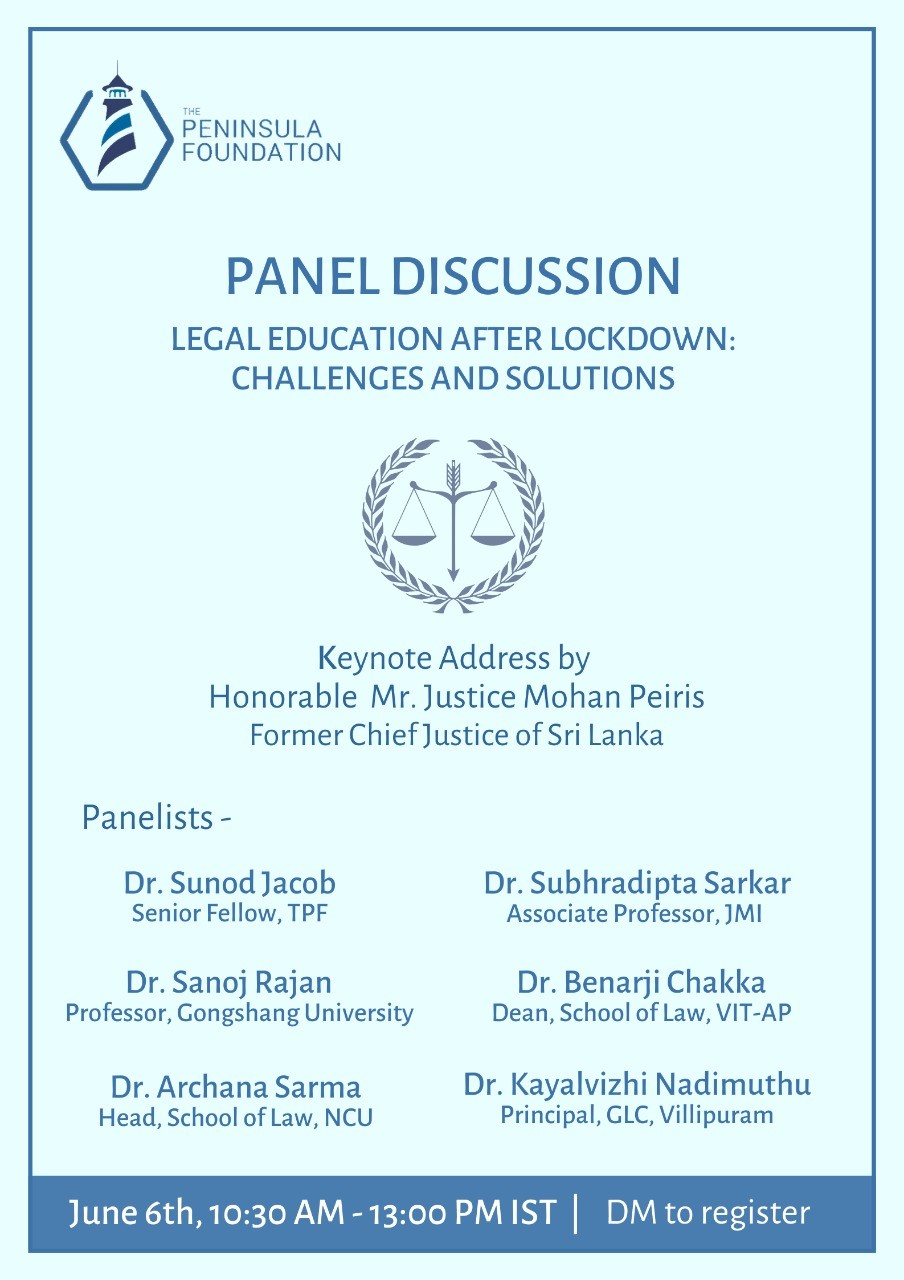Panel Discussion: Legal Education after Lockdown

Chennai, June 06 2020 l The Peninsula Foundation organized an Online Panel Discussion on the theme, “Legal Education After Lockdown: Challenges and Solutions,” with Honorable Justice Mohan Peiris, Former Chief Justice of Sri Lanka as the Keynote Speaker, and 6 Law experts as Panelists, from all across India.
In his Keynote Address, Justice Peiris said that he would describe this as a gigantic educational crisis, as more than 1.6 billion children and youth are out of schools. We also have a global learning crisis, where many students were in school but were not learning the skills of life. There is pedagogical difference between teaching in person and teaching online and we see the importance of community and coming together in person. Though, these uncertain times call for a transformative period in the way we live, as a moment of crisis such as this also lends itself to opportunity. He concluded by saying we are not only alone together, but together alone.
Dr. Sunod Jacob, Senior Fellow, TPF led the Panel Discussion, as the Panelists shared their views on the survey study conducted by Team Peninsula Foundation on the impact of COVID-19, with a focus on the peninsular States. Dr. Jacob raised an interesting question, though teaching has been completed, to what extent has learning taken place? Crucial points such as accessibility to devices also highlights the digital divide and raises questions on the lack of basic infrastructure for students and teachers alike.
Dr. Archana Sarma, Head, School of Law, NCU, explained how both students and teachers are not ready for online classes. There are valid struggles and challenges regarding online education, namely internet connection. When it comes to conducting online examinations, the 3 hour duration brings internet accessibility issues with it, and it is unfair on the students who are unable to get a stable connection or sufficient data packs.
Dr. Sanoj Rajan, Professor, Gongshang University, China, explained how the situation was in China, saying that this is definitely a learning experience, but it will be hard to leave behind the practices we have been following so far. Artificial Intelligence is being used in the conduct of examinations, and there are complaints of connectivity, however to determine whether this is authentic or just an excuse is difficult. Students also face challenges such as typing skills when it comes to online examinations, also highlighting a lack in the education students receive.
Dr. Benarji Chakka, Dean, School of Law, VIT-AP, further continued by emphasizing the technology divide, within educational institutions themselves, as not all of them have the equipment to make online education a reality. The class divide is clearly visible, and those living in rural areas have limited accessibility to devices and stable connectivity.
Dr. Kayalvizhi Nadimuthu, Principal, GLC, Villupuram, shared about the gender and economic divide in rural areas, where 60% of 11,500 students are females, taking great initiative in learning. However, during lockdown and online courses, male students took more of an effort. Students also do not prefer video platforms, she pointed out. The government should consider providing laptops to college students, and develop a mechanism to ensure internet accessibility to all to help bridge the gap in accessibility.
Dr. Subrahdipta Sarkar, Associate Professor, JMI, pointed out the disengagement in students in online education. Again mentioning that it is difficult to determine whether students are really listening or whether they use lack of internet access as an excuse. He also mentioned how the GST on technological devices are too high, and must be reduced to allow everyone to be able to afford it.
